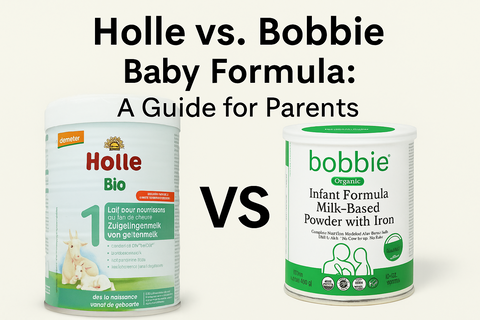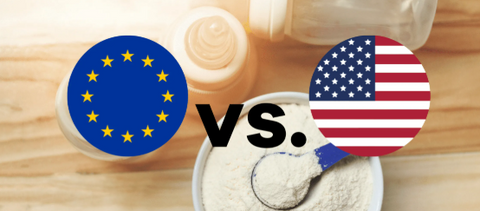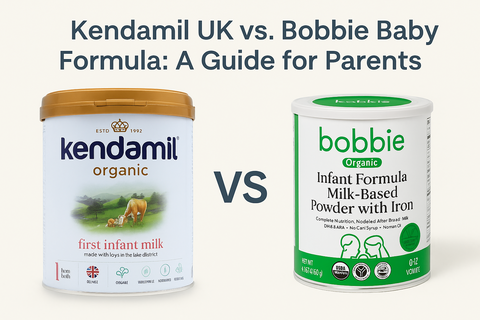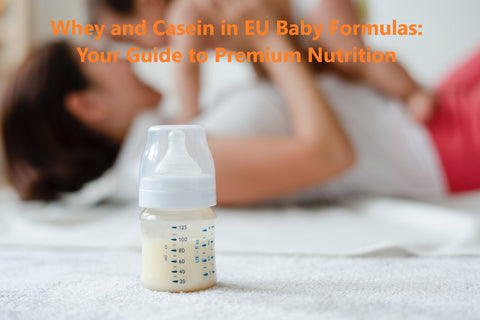Why are European Organic Formulas so safe?
It’s been two years since the massive US formula shortage started in 2022, which launched a crisis to keep babies fed across the US. In late February 2023, formula giant Reckitt issued a press release recalling 145,000 cans of Enfamil. At the beginning of 2024, another major recall of Nutramigen hypoallergenic infant formula due to dangerous bacterial contamination sparked concerns among many parents in the US.
Due to these recent recalls, the customer support team of Organic Formula Shop received countless emails from concerned parents, caregivers, and grandparents with questions like: Are EU-manufactured formulas safe? Have there been recent formula recalls in the EU from the brands you carry? We totally get these worried questions; hence, this blog explains why EU-made formulas are the safest in the world. Don't worry; safe and reliable alternatives like European baby formulas offer great nutritional and digestive support, even for the most sensitive infants. Safety never tasted so good!
Please note:
Parents and caregivers must be aware of the recent recall of approximately—675,000 cans of Nutramigen hypoallergenic infant formula due to dangerous bacterial contamination. If you have any affected cans, it is essential to dispose of them immediately to ensure the safety and health of your little one!
History counts
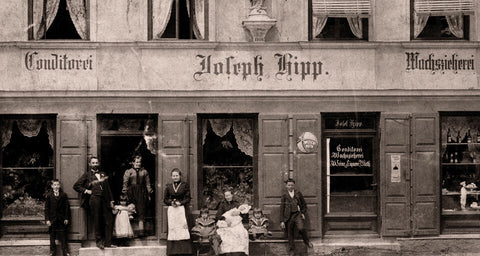
"Expertise blossoms with experience and experience is cultivated through a rich history of refinement!"
Brands like HiPP, Holle, and Lebenswert, have decades of history and expertise in manufacturing infant formula. The HiPP brand was founded in Germany in 1932 and has been an innovation leader in baby food, organic, and ecological businesses ever since.
Holle, established in 1934, also brings extensive experience in organic baby food production. For many years, Lebenswert, a Holle brand, has focused on biodynamic farming for premium organic formulas. Each brand combines tradition with modern nutritional science, ensuring safe and reliable infant formulas with a history of organic farming and dedication to infant well-being.
Safety due to stringent regulations
European-made Organic Formulas like HiPP, Holle, Lebenswert, and BebeM adhere to stringent regulations set by the European Food Safety Authority (EFSA).

The EFSA establishes rigorous standards, ensuring these formulas are free from harmful substances. These brands prioritize organic, high-quality ingredients that meet or exceed EU certification requirements. The commitment to purity, strict oversight, and compliance with high-set safety measures contribute to their reputation for producing safe and reliable infant formulas. If you want to know more about what sets EU and US formulas apart, click here.
Before European-made Organic Formulas are allowed on the market, they undergo thorough testing and evaluation. The process typically involves the following steps:
- Ingredient Selection: Brands choose high-quality, organic ingredients, and suppliers must meet specific standards.
- Formula Development: Nutritional experts and scientists create the formula, ensuring it aligns with EU regulations and provides essential nutrients for infants.
- Laboratory Testing: Rigorous testing is conducted in specialized laboratories. This includes analyzing raw materials and finished products for contaminants, nutritional content, and adherence to EU standards.
- Clinical Trials: Some formulas may undergo clinical trials to assess their safety and efficacy. This involves feeding the formula to infants while monitoring their health and development.
- Regulatory Approval: Formulas are submitted to regulatory bodies, such as the European Food Safety Authority (EFSA), for approval. Authorities review the scientific data, ensuring compliance with safety and nutritional requirements.
- Quality Control: Continuous quality control measures are implemented during production. This includes regular testing of batches to maintain consistency and safety.
- Traceability: Each product is traceable to its source, allowing quick identification and removal of any potentially compromised batches.
- Monitoring and Surveillance: Post-market surveillance involves ongoing monitoring of products in the market to detect and address any emerging safety concerns.
By complying with these rigorous testing and quality control measures, European formulas ensure that only safe and nutritionally sound products reach the market. The commitment to transparency, traceability, and compliance with strict regulations contributes to their reputation for safety and reliability.
Own livestock for organic milk.

The journey of producing high-quality EU organic infant formula begins before the ingredients even reach the production site. It begins with raising their cows in organic and humane conditions. HiPP, Holle, and Lebenswert have high animal welfare standards in their organic farming practices. Cows in these programs are kept in conditions that prioritize their well-being. This includes access to pasture for grazing, organic and biodynamic feed, and avoidance of synthetic chemicals. This dedication extends beyond ingredients, reflecting a holistic approach to infant nutrition.
How do EU manufacturers execute these strict rules and do their testing?
The reputable European organic formula brands we carry at Organic Formula Shop have their own laboratories or work closely with certified laboratories. The testing processes are highly meticulous and involve checking various aspects to ensure safety, quality, and adherence to the EU organic standards of each batch of formula produced. Here's an overview of the critical aspects checked during testing:
- Raw Materials Testing:
- Ingredients: All ingredients, including organic milk, oils, and carbohydrates, undergo testing to verify their quality and compliance with organic standards.
- Contaminants: Rigorous testing ensures raw materials are free from contaminants such as pesticides, heavy metals, and microbiological impurities.
- Production Process:
- Hygiene and Sterilization: The entire production process is scrutinized to ensure hygiene standards are maintained. Sterilization methods are validated to eliminate harmful bacteria.
- Consistency: Quality control measures are in place to maintain consistency in formulations and prevent variations between batches.
- Nutritional Content:
- Nutrient Levels: Formulas are tested to verify that they meet the nutritional standards outlined by EU regulations for infant formula.
- Microbiological Testing:
- Pathogens: Regular testing is performed to detect and eliminate any harmful microorganisms that could compromise the safety of the formula.
- Packaging and Storage:
- Packaging Materials: The safety of packaging materials is assessed to ensure they do not leach harmful substances into the formula.
- Storage Conditions: Recommendations for storage conditions are validated to maintain the stability and safety of the formula.
- Regulatory Compliance:
- EU Organic Standards: Formulas are tested to ensure compliance with strict EU organic standards, including restrictions on synthetic pesticides, herbicides, and genetically modified organisms (GMOs).
- Allergen Control:
- Allergen Testing: Formulas are tested for common allergens such as soy, gluten, and cow's milk proteins to prevent allergic reactions.
- Quality Assurance:
- Traceability: The entire production chain is traceable, allowing quick identification and removal of any compromised batches.
- Quality Management: Brands implement robust quality management systems to improve processes and address emerging issues continuously.
By addressing these aspects, European organic formula brands prioritize the safety, nutritional quality, and well-being of infants, earning parents' trust globally. The commitment to stringent testing standards ensures that their products consistently meet the highest quality and safety standards.
Formula in Quarantine
During the testing phase, products are held in quarantine to prevent their release into the market until thorough testing is completed. Quarantine is a standard quality control and safety assurance practice across various industries, including infant formula production.
The purpose of quarantine is to:
- Ensure Product Integrity: Keeping products in quarantine prevents their distribution before confirming that they meet the required safety and quality standards. This helps avoid any potential risks associated with releasing substandard or unsafe products.
- Facilitate Traceability: Manufacturers can easily trace and identify specific batches undergoing testing by holding products in quarantine. This traceability is crucial for swiftly addressing issues arising during the testing phase.
- Comply with Regulations: Following regulatory guidelines, particularly in the food and pharmaceutical industries, often involves implementing quarantine measures as part of good manufacturing practices (GMP).
Once products pass the required tests and are deemed safe and compliant, they are released from quarantine and allowed to enter the market. This rigorous quality control process ensures that only products meeting the highest safety and quality standards are made available to consumers, especially in infant formula, where the health and well-being of infants are paramount. Organic Formula Shop receives its formula directly from the manufacturers after a fresh batch is released. Due to our high turnover, most of this formula is being carefully packed within days after arrival in our warehouse and on its way to parents in the US. Our guarantee: Safe and fresh formula with a long shelf life!
Real-world example: HiPP GmbH & Co
So now that we know all of the above, let’s give you a general overview of the processes involved in the selection, production, and safety procedures for infant formula of the most well-known European manufacturer of premium organic infant formula: HiPP GmbH.
1. Ingredient Selection:
- HiPP carefully selects organic ingredients based on their nutritional value, quality, and adherence to organic farming standards.
- Ingredients may include organic milk, essential fatty acids, vitamins, and minerals.
2. Formulation:
- Formulation is based on scientific research to ensure the nutritional content aligns with the specific needs of infants.
- The goal is to mimic the composition of breast milk, providing essential nutrients for healthy growth.
3. Production:
- Stringent hygiene and quality control measures are in place during production.
- HiPP employs advanced technology and adheres to strict manufacturing protocols.
- Production facilities are designed to prevent contamination and ensure product consistency.
4. The HiPP laboratory:

- HiPP conducts rigorous quality control checks at various stages of production in the company's accredited laboratory, one of the best in Europe.
- Testing includes checks for ingredient quality, nutritional content, and absence of contaminants. In their laboratory, they can analyze more than 1,200 parameters.
Fun fact:
The HiPP laboratory is so sensitive it can detect a grain of salt in a 25 m (82 ft) swimming pool. How Awesome is that!
5. Safety Procedures:
- Produced batches of formula are being held in Quaranteen. Once products pass the required tests and are deemed safe and compliant, they are released from quarantine and allowed to enter the market.
- HiPP follows Good Manufacturing Practices (GMP) to ensure a clean and controlled environment. Equipment at the Production Site is being maintained and cleaned regularly.
6. Regulatory Compliance:
- HiPP, as a European company, complies with EU regulations and standards the EFSA sets for infant formula production.
- HiPP undergoes routine inspections by relevant authorities to ensure the execution of these standards.
7. Traceability:
- Comprehensive traceability systems track ingredients from source to finished product.
- This ensures that any issues can be quickly identified and addressed.
8. Continuous Improvement:
- Companies like HiPP continually commit to ongoing research and development to enhance their formulas.
- Customer feedback, scientific advancements, and regulatory updates contribute to continuous improvement.
Please note: We don't have access to specific, real-time details about the current operations at HiPP’s production site in Germany.
General tips for safely preparing formula:

Choosing premium organic formulas from reputable EU manufacturers ensures optimum safety for your little one. As explained in this article, these brands follow rigorous standards, using quality ingredients and ethical practices. Additionally, as a parent, you play an essential role in enhancing safety by following recommended guidelines for formula preparation. Prioritize hygiene, use safe water sources, and accurately measure formula proportions. By combining top-tier formula choices with responsible preparation, you contribute to creating a nurturing and secure feeding environment for your baby! Here are some important tips on how to safely prepare your formula:
- Wash hands thoroughly before handling bottles.
- Sanitize the formula preparation area.
- Ensure the cleanliness of bottles for each use.
For powdered formula:
- Use safe water; contact local health departments for tap water verification.
- Follow formula instructions for water quantity, measuring before adding powder.
- Consider extra precautions for infants at higher Cronobacter risk.
- Safely prepare powdered formula using boiling water, not for sterilization but to minimize bacteria. This is crucial for non-sterile powdered formulas.
Always prioritize safety. If you doubt formula quality, storage, or any concerns, discard and do not store unfinished bottles. Follow proper protocols in case of power loss, treating formula like other perishable foods in the refrigerator.
Conclusion
European organic formulas like HiPP, Holle, and Lebenswert exemplify safety backed by decades of expertise. Their commitment begins with ethical farming practices, including owning cows in organic, humane conditions. Rigorous testing, from raw materials to production, adheres to strict EU organic standards, ensuring safety and quality. The HiPP case study illustrates meticulous procedures, from ingredient selection to laboratory testing, emphasizing Good Manufacturing Practices (GMP) and continuous improvement. Parents play a crucial role by choosing these premium formulas and following recommended preparation guidelines, fostering a secure feeding environment for their babies. Safety never tasted so good!
Contact our dedicated customer support team at Organic Formula Shop for expert advice and guidance tailored to your baby's needs. They have earned hundreds of 5-star reviews from our customers, helping you to provide the best nutrition for your little one. Contact us here or shoot us an email at support@organicformulashop.com. We're here to help!

